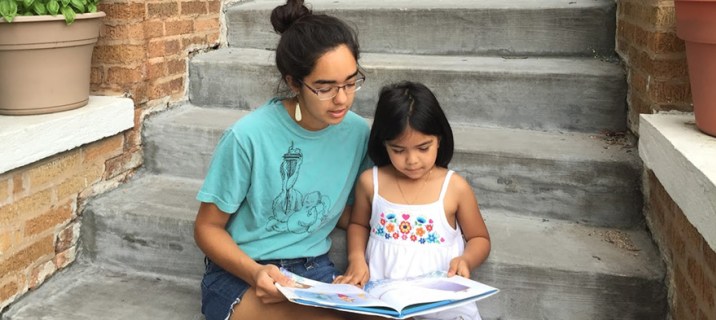After a nearly hour-long commute home, I walk into the living room and sit down next to my little brother and sister to catch a glimpse of whatever goofy cartoon they’re watching.
I’m groggy from a long day at work, but after a few minutes I get right back up and change to take them to the park or bring out watercolors to paint, because I know it’s good for them.
MOST SUMMERS IT’S DIFFICULT TO FIND ACTIVITIES FOR THEM THAT ARE BOTH ENRICHING AND AFFORDABLE. During the school year, my siblings typically attend extracurricular activities held at school or at our neighborhood parks like gymnastics and math club, but most summers it’s difficult to find activities for them that are both enriching and affordable.
I know my family isn’t the only one that struggles with this. Many low-income students “can’t afford summer” and don’t benefit from the same enrichment and extracurricular activities their affluent peers take advantage of over the summer.
EXERCISING THE MIND
This summer however, I was pleasantly surprised to see my 5-year-old sister Sophia working on a variety of projects assigned by her soon-to-be kindergarten teacher.
Sophia will be attending UNO Soccer Academy, a K-8 public charter school on Chicago’s Southwest side that is 99 percent Latino, nearly all of them from low-income and working class families.
The goal is that students will spend at least some portion of their shorter-than-average summer break exercising their brains and getting ready for the start of a new school year on August 9.
Sophia has had to read (or in her case, be read) 20 books this summer as a part of a summer reading program assigned to students entering grades K-2.
TEACHERS TURNED THIS INTO A LITERARY SCAVENGER HUNT OF SORTS
Instead of making this a dry reading log, the teachers turned this into a literary scavenger hunt of sorts: Sophia had to read a book by her favorite author, a book in Spanish, a book she’s never heard of, a book where animals talk, and a book without words that she had to narrate.
The school even hosted a book exchange halfway through the summer to ensure that students have a wide variety of books to choose from.
In addition to reading over the summer, students are expected to complete several projects. Sophia had to get a library card, make a puppet, follow a recipe, write a letter to her future teacher, visit two museums and even interview a librarian.
Summer break is about 6 weeks long for Soccer Academy students, so almost every day Sophia has a book read to her or works on a project.
Often my other siblings and I get involved and read to her or work on projects together, such as making a puppet (Sophia and Andrea, my 17-year-old sister, made a mouse named Penny).
ALL IN THE FAMILY
When I first looked at the list of Sophia’s summer assignments I was both excited and overwhelmed—it seemed like a lot to ask of my baby sister.
However, when I asked my mom about them, she said they have been a great opportunity for our whole family to get involved with Sophia’s education.
“These summer projects have helped Sophia get ready for kindergarten by preparing her to expect more work than the previous year and to trust in her own abilities,” she said.
My mom added, “It also helped her understand that there are things she doesn’t know, and she’s fine with that. For example, she knows that she doesn’t know how to read yet, but she’s close and she’s excited to learn in kindergarten.”
The value of summer enrichment and extracurricular opportunities cannot be underestimated, as they help reduce the growing income-based achievement gaps in our education system.
Not only do summer projects like Sophia’s prepare students for the new school year, they also connect parents to their children’s school and help teachers gauge incoming students’ learning levels.
Most kids in our neighborhood don’t have access to pricey day camps and enriching activities during the summer, so I’m glad that schools like Sophia’s recognize this and try to make summer learning engaging for all students and their families.
Brenda Benitez
Latest posts by Brenda Benitez (see all)
- Less Loans than You Might Think: Why Going to College is Still Worth it-If You Get a Degree - September 22, 2016
- Menos Préstamos de Lo Que Usted Pueda Creer: Por Qué Ir a La Universidad Todavía Vale La Pena, Si Se Obtiene Un Diploma - September 22, 2016
- Dual-Language Programs Reconsidered in California - August 23, 2016
- Programas Bilingües Reconsiderados en California - August 23, 2016
- New San Bernardino Charter School is Helping at-Risk Students get on the Right Path - August 17, 2016

